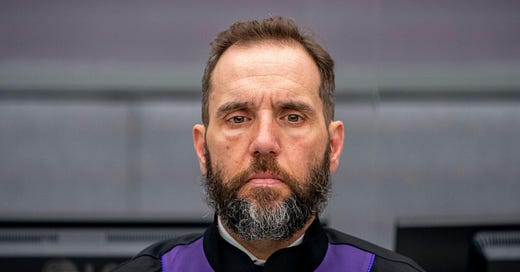Trump’s January 6 prosecutor is playing a blinder
It appears Jack Smith may have done enough to overcome Donald Trump’s immunity defence and get him in front of a jury.
The United States has entered new territory as a nation of laws. The last couple of years have seen the private, the political and the official swirled together into a great milkshake of legal madness that is very difficult to sift into its constituent parts.
Where emotion and politics collide with the world of the law, the facts and evidence must be brought front and centre if we are to find a path to the truth.
But which facts? This is the challenge facing January 6 Special Counsel, Jack Smith, and Donald Trump’s other prosecutors in a “post-truth” world where even the impartiality of our Supreme Court is called into question.
The historian’s historian, EH Carr, said: “The facts are not at all like fish on the fishmonger’s slab. They are like fish swimming about in a vast and sometimes inaccessible ocean; and what the historian catches will depend…mainly on what part of the ocean he chooses to fish in and what tackle he chooses to use…”
The same applies to attorneys. While most commentaries about the 1 July immunity ruling suggest the Supreme Court gave Trump blanket immunity for his acts while President, the ruling is better understood as a roadmap to navigate that immunity through the separation of official and private acts. Whether this gives future presidents latitude to rule like tyrants remains to be seen.
Using this route, Jack Smith has expertly fished out the right facts and succeeded in sorting private from official conduct by Trump. There are 76 witnesses referred to as “P” in the first 13 pages of his filing, all of them apparently linked to the Trump Campaign, not the White House. He has presented overwhelming evidence that Trump was acting as a private person and so not immune.
Smith has also brought the right opinions to bear. He smartly quoted Justice Amy Coney-Barrett, a Trump appointee and well-known conservative justice, who said that some of Trump’s acts as president could be considered private: “The defendant’s conduct with respect to the elector scheme is inherently private, and not subject to immunity… Sorting private from official conduct sometimes will be difficult—but not always. Take the President’s alleged attempt to organize alternative slates of electors. In my view, that conduct is private and therefore not entitled to protection.”
Considering that Trump’s legal team has appealed almost every adverse court decision, Smith’s filing appears to be geared towards swinging Justice Barrett, and likely Chief Justice Roberts, to reject the immunity claim. Despite being nominated by the Republicans, Roberts has been known to buck conservative opinion, including voting to uphold Obamacare. Swinging these two voices would lead to a 5-4 decision rejecting immunity.
What comes next? While Donald Trump’s other prosecutors are seeing their cases punted into the hazy distance, Smith has likely helped his come to a speedier conclusion. It appears he may have done enough to overcome the immunity argument and get in front of a jury.
The result of a trial is much harder to predict. Expect Trump’s attorneys to bring a blowtorch to the credibility of every witness, and the reliability and motivation of their recollections will be challenged. For example, I have seen several situations where witnesses have testified to being at a meeting several years prior and then find out that they were out of the country during that meeting and confusing and conflating two meetings.
Trump’s legal team will have an opportunity to demonstrate that this overwhelming evidence is not reliable or that the witnesses are mistaken, misremembering, or outright lying, sowing seeds of doubt in the jury’s mind while screaming “witch hunt” and “political persecution.”
And there is a wilder factor at play, one that may give a funny flavour to some of the fish Jack Smith has chosen to serve up. Donald Trump’s term in office was marked throughout by erratic behaviour and an unpresidential tone. This may help blur the distinction between what Trump and his team considered as official versus non-official acts, allowing his attorneys to cast doubt on the facts as they appear. As a sitting President at the time, he may be given the benefit of the doubt.
Trump’s behaviour under indictment is another matter. He is doing himself no favors by acting like a mafia boss in his social media statements. It would be best if he simply states that the evidence will reveal that he did nothing wrong and allows his lawyers to put on the case in a court of law rather than trying the case in the court of public opinion.
We are in another election in which many believe that, if he loses, Trump will again try to challenge the results through legal and illegal means. But this time around, plain old candidate Trump will have no immunity defense to hide behind.
Bryan Sullivan is a leading US attorney, representing well-known individuals and corporations






